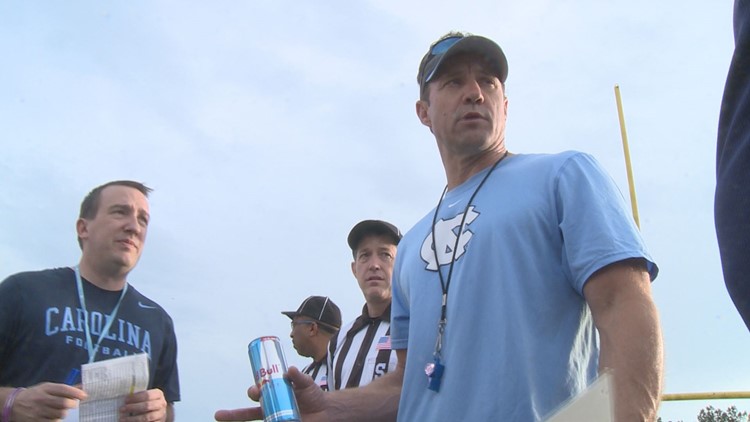CHARLOTTE – North Carolina head coach Larry Fedora questioned the validity of studies detailing football’s role in the onset of Chronic Traumatic Encephalopathy, also known as CTE, a degenerative brain disease found in cases of repetitive head trauma.
It hasn’t been definitively proven that football causes CTE, Fedora said during his appearance at Atlantic Coast Conference media days, but the fact that the connection has been made has impacted how people view the sport.
Fedora also spoke specifically about how rule changes in college football are changing the game, and not for the better. As football goes, Fedora said, so goes our country.
“Our game is under attack,” Fedora said. “I fear that the game will be pushed so far from what we know that we won’t recognize it 10 years from now. And if it does, our country will go down, too.”
WFMY spoke to a youth football coach on the phone about Fedora's comments. Piedmont Youth Football Coach Vince Jacobs said he was very 'surprised' that Fedora made those remarks, because there's science proving CTE is linked to concussions that sometimes happen in football.
"You have to take that stuff seriously, you can't mislead parents," Jacobs said. "It's a tough decision parents have to make nowadays whether they sign their kids up for sports or not. There is risk involved."
In 2013 Coach Jacobs' league started 'Baseline Concussion Testing.' His website states:
"It is recommended that every child take a baseline concussion test at the beginning of the athletic season.This simple test can be completed online with a home computer. The only requirement is that you have a mouse attached and a $5.00 fee. Recognition and proper management of a concussion is crucial to avoiding additional serious injury. A repeat concussion that occurs before the brain recovers from the first can result in brain swelling, permanent brain damage and even death.”
Dr. Zachary Sandbulte, a sports medicine specialist at Novant Health Sports Medicine, says he agrees with Larry Fedora to an extent.
"I agree with him that it’s very hard to determine causality and be able to prove something especially in the case of CTE," Dr. Sandbulte said. "The data is certainly concerning and suggestive that there is a link though and the NFL admitted a link a few years ago."
Dr. Sandbulte says there is much more research to be done on CTE. CTE can only be diagnosed through an autopsy.
"Doctors are trying to prove causality between football and CTE," Dr Sandbulte said. "The problem is that the study designed to prove causality takes a long time so it takes a long time to get that information. But again, the studies right now are very suggestive because we see high prevalence of CTE post mortem in prior NFL players."
But he wants to make it clear, concussions can happen in any contact sport.
"I don’t know if its been looked at to the degree that its been looked at in football to any other sport. There’s some concerns that sports like boxing, hockey and soccer can also lead to CTE."
Dr. Sandbulte works with many student athletes from Davidson County Schools. He says the schools average 8-10 concussions each fall.
"We treat quite a few concussions," Dr. Sandbulte said. "We cover Davidson County High Schools and they average about 8-10 per school during the fall, not only in football but obviously the majority of them come from football."
In 2008, a Winston Salem student died after sustaining injuries during a football game. Matthew Gfeller died two days after a hemet-to-helmet collision in a football game for Reynolds High School.
The Matthew Gfeller Center sent this statement in response to Fedora's controversial comments.
"The debate surrounding football safety is a heated topic. The science of CTE (chronic traumatic encephalopathy) remains in its infancy. Far more is unknown about CTE than is known. We believe participating in football carries some risk, but that these risks are mitigated more today than ever before by advances in equipment, concussion knowledge, rule changes, medical management and policies adopted by institutions and governing bodies to protect the safety and welfare of student-athletes. We are proud that the Matthew Gfeller Center and the Center for the Study of Retired Athletes at UNC-Chapel Hill are in the forefront of converging our research expertise to study not only CTE but all aspects of concussion prevention, diagnosis, treatment and rehabilitation."
In recent years, the NCAA has adopted measures designed to improve player safety, from beefing up previously nonexistent targeting rules and compiling a national guideline for handling concussion protocol.
CHARLOTTE – North Carolina head coach Larry Fedora questioned the validity of studies detailing football’s role in the onset of Chronic Traumatic Encephalopathy, also known as CTE, a degenerative brain disease found in cases of repetitive head trauma.
It hasn’t been definitively proven that football causes CTE, Fedora said during his appearance at Atlantic Coast Conference media days, but the fact that the connection has been made has impacted how people view the sport.
Fedora also spoke specifically about how rule changes in college football are changing the game, and not for the better. As football goes, Fedora said, so goes our country.
“Our game is under attack,” Fedora said. “I fear that the game will be pushed so far from what we know that we won’t recognize it 10 years from now. And if it does, our country will go down, too.”
In recent years, the NCAA has adopted measures designed to improve player safety, from beefing up previously nonexistent targeting rules and compiling a national guideline for handling concussion protocol.
CHARLOTTE – North Carolina head coach Larry Fedora questioned the validity of studies detailing football’s role in the onset of Chronic Traumatic Encephalopathy, also known as CTE, a degenerative brain disease found in cases of repetitive head trauma.
It hasn’t been definitively proven that football causes CTE, Fedora said during his appearance at Atlantic Coast Conference media days, but the fact that the connection has been made has impacted how people view the sport.
Fedora also spoke specifically about how rule changes in college football are changing the game, and not for the better. As football goes, Fedora said, so goes our country.
“Our game is under attack,” Fedora said. “I fear that the game will be pushed so far from what we know that we won’t recognize it 10 years from now. And if it does, our country will go down, too.”
In recent years, the NCAA has adopted measures designed to improve player safety, from beefing up previously nonexistent targeting rules and compiling a national guideline for handling concussion protocol.



